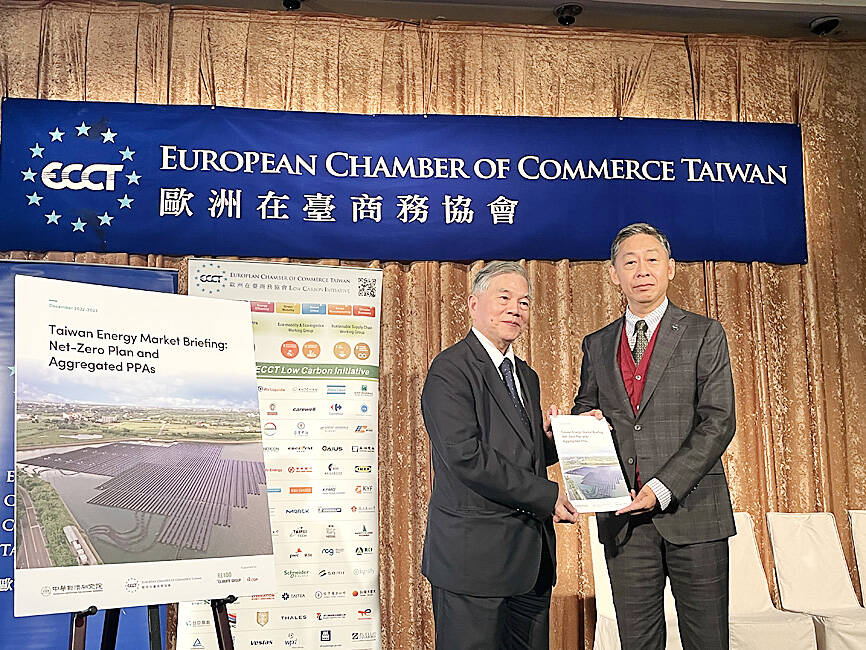Taiwanese companies are struggling to procure renewable energy domestically, as the grid is not meeting demand in terms of supply and access, meaning the nation would likely fall short of its renewable energy goals for 2025, the RE100 global initiative said in a report.
The report, titled “Taiwan Energy Market Briefing: Net-Zero Plan and Aggregated PPAs,” was released on Wednesday with the European Chamber of Commerce Taiwan. It was sponsored by Cathay Financial Holdings Co (國泰金控), Grape King Bio Ltd (葡萄王), Hua Nan Commercial Bank (華南金控), Taiwan Mobile Co (台灣大哥大) and PwC Taiwan (資誠聯合會計師事務所).
Demand for renewable energy has increased in the past few years, as RE100 members progress toward their targets, the report said.

Photo: Hsu Tzu-ling, Taipei Times
More Taiwanese companies have committed to using renewable energy, while heavy power consumers are being pushed through legislation to use more green energy, it said.
RE100 is a global initiative bringing together influential businesses devoted to using 100 percent renewable electricity at their facilities.
However, high costs and low supply remain the two biggest reasons for a lack of corporately sourced renewable energy in Taiwan, compared with two years ago when high costs, low supply and lack of market transparency were identified as the main barriers, the report said.
Bundled renewable energy certificates are expensive in Taiwan and corporate power purchase agreements are costly, as they require that buyers be large electricity consumers and sign 10 to 20-year contracts, it said.
That makes purchasing bundled renewable energy certificates economically not feasible, while corporate power purchase agreements are limited to a few companies that meet the requirements, it added.
The rules make most RE100 members with operations in Taiwan unable to pass the criteria, the report said.
One possible solution is an aggregated power purchase agreement (APPA) that would bring together two or more companies to negotiate and purchase renewable energy, it said.
By doing so, developers and purchasers would benefit from economies of scale, the report said, adding that corporations and stakeholders seem eager to join forces to overcome barriers that appear significant.
Vice Premier Shen Jong-chin (沈榮津) said that while APPAs would not necessarily reduce electricity costs and could involve longer contract periods, they might allow partner companies to achieve economies of scale.
He said he would ask the Bureau of Energy to look into the suggestion and brief him.
Government figures showed that renewable energy accounted for 6.3 percent of Taiwan’s total power supply last year, a slight increase from 5.8 percent in 2020, the report said.
While the government had previously committed to increasing the share of electricity generated from renewable energy sources to 20 percent by 2025, the report estimated that this goal was unlikely to be reached until 2026 or 2027.
Additional reporting by CNA

Sweeping policy changes under US Secretary of Health and Human Services Robert F. Kennedy Jr are having a chilling effect on vaccine makers as anti-vaccine rhetoric has turned into concrete changes in inoculation schedules and recommendations, investors and executives said. The administration of US President Donald Trump has in the past year upended vaccine recommendations, with the country last month ending its longstanding guidance that all children receive inoculations against flu, hepatitis A and other diseases. The unprecedented changes have led to diminished vaccine usage, hurt the investment case for some biotechs, and created a drag that would likely dent revenues and

Macronix International Co (旺宏), the world’s biggest NOR flash memory supplier, yesterday said it would spend NT$22 billion (US$699.1 million) on capacity expansion this year to increase its production of mid-to-low-density memory chips as the world’s major memorychip suppliers are phasing out the market. The company said its planned capital expenditures are about 11 times higher than the NT$1.8 billion it spent on new facilities and equipment last year. A majority of this year’s outlay would be allocated to step up capacity of multi-level cell (MLC) NAND flash memory chips, which are used in embedded multimedia cards (eMMC), a managed

CULPRITS: Factors that affected the slip included falling global crude oil prices, wait-and-see consumer attitudes due to US tariffs and a different Lunar New Year holiday schedule Taiwan’s retail sales ended a nine-year growth streak last year, slipping 0.2 percent from a year earlier as uncertainty over US tariff policies affected demand for durable goods, data released on Friday by the Ministry of Economic Affairs showed. Last year’s retail sales totaled NT$4.84 trillion (US$153.27 billion), down about NT$9.5 billion, or 0.2 percent, from 2024. Despite the decline, the figure was still the second-highest annual sales total on record. Ministry statistics department deputy head Chen Yu-fang (陳玉芳) said sales of cars, motorcycles and related products, which accounted for 17.4 percent of total retail rales last year, fell NT$68.1 billion, or

In the wake of strong global demand for AI applications, Taiwan’s export-oriented economy accelerated with the composite index of economic indicators flashing the first “red” light in December for one year, indicating the economy is in booming mode, the National Development Council (NDC) said yesterday. Moreover, the index of leading indicators, which gauges the potential state of the economy over the next six months, also moved higher in December amid growing optimism over the outlook, the NDC said. In December, the index of economic indicators rose one point from a month earlier to 38, at the lower end of the “red” light.